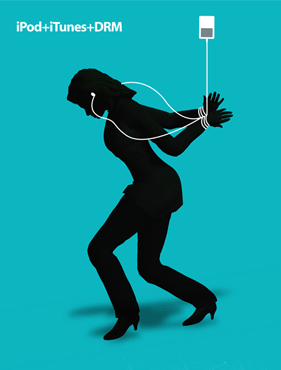Why Apple deletes files from users' computers
Personal files are transferred to the cloud and removed from the disk, some irrevocably
 Some Apple users have encountered an unusual problem: MP3 and WAV music files are missing on their computers. The situation in bright colors describes one of the victims, James Pinkstone (James Pinkstone), who lost the music collection of 122 gigabytes. ITunes simply deleted the files from the disk.
Some Apple users have encountered an unusual problem: MP3 and WAV music files are missing on their computers. The situation in bright colors describes one of the victims, James Pinkstone (James Pinkstone), who lost the music collection of 122 gigabytes. ITunes simply deleted the files from the disk.James unsuccessfully sought a solution on the forums, and then turned to technical support with the help of why iTunes had deleted his personal files without permission. They explained that the Apple software was functioning normally, and it was supposed to work that way. Everything is done in full accordance with the user's agreement, which he accepted when subscribing to Apple Music. Files just transferred to the cloud. Unfortunately, some files had to be recoded to another format with a loss of quality, but the originals have already been deleted. All right, worry late.
After subscribing to Apple Music, iTunes scans your hard drive and catalogs all the found music files (MP3, WAV) according to the online database. After that, it makes a list of the user's music tracks in the cloud and deletes the original files from the disk.
If Apple Music finds a file that cannot recognize it, it uploads it to the Apple database and still removes it from the hard drive, and then downloads the user to the computer from the cloud, if necessary.
This raises several problems, writes Pinkstone.
1. To access his personal and work files (James works as a freelance composer and many files are his own work) requires the Internet, which is not always available. That is, without the Internet, he loses access to his own music - and to his works, and to copies of discs, which he digitized for many years, even before the appearance of iTunes. Why does Apple decide where and when it can open its private files?
2. Sometimes iTunes algorithms work incorrectly and replace some rare version of the composition with another version of the same author and with the same name. Thus, in reality, Apple will not exist rare, little-known versions of the song: everything is standardized and unified.
3. Although the file can be downloaded from the cloud back to disk, Apple servers are not so fast as to quickly return files. Pinkstone says that it would take him 30 hours to download his 122 gigabytes.
4. Even if you downloaded your music back, an unpleasant surprise awaits you: there will be no original files. For example, at Pinkstone, the entire collection of tracks in the WAV format was reversed by Apple in the AAC and MP3 formats with a loss of quality.
That is, the user not only has to pay for the Apple Music service, but also put up with the fact that the music will become worse quality than it was before.
“You are probably wondering why numerous lawsuits have not yet been filed against Apple,” writes James Pinkstone, and immediately explains. - The reason is their user agreement. Under the terms of iTunes Terms of UseThe company disclaims any responsibility for the incorrect operation of the Apple Music service.

The agreement expressly states that “under no circumstances” Apple or its employees may be liable for “any loss or damage of any kind resulting from the use of Apple products”.
Each user agrees that they will use Apple Music "at their own risk." In the conditions there is one more point: if you cancel the Apple Music subscription, all user files are permanently deleted .
James Pinkstone believes that the general meaning of the user agreement can be conveyed by one picture .
He himself was able to restore the original files from the backup, but sympathizes with those who do not backup.
“For ten years now I have been telling people: hold on to your media files. Someday you will not be able to buy a movie. You will be buying the right to watch a movie , and the movie will be broadcast for you, says James Pinkstone. - If the company does not want you to watch this film, or something changes, it will be entitled to refuse to view you. They can replace the story and make you pay again for the things you bought before. Information will become a service, not your property. Even the information you created yourself will require endless recurring payments just for accessing it. ”
It looks like the situation was even worse than we thought. Rights holders and companies like Apple do not just restrict access to content, but already penetrate into our personal computers and delete files that were there before . This was hard to imagine, but it is happening.
Apple’s total control over user files is reminiscent of their well-known “1984” ad, which came to life in mirror image, in sad and depressing irony, Pinkstone writes.
